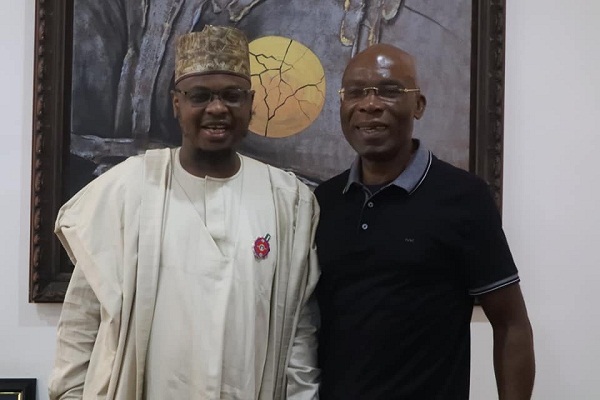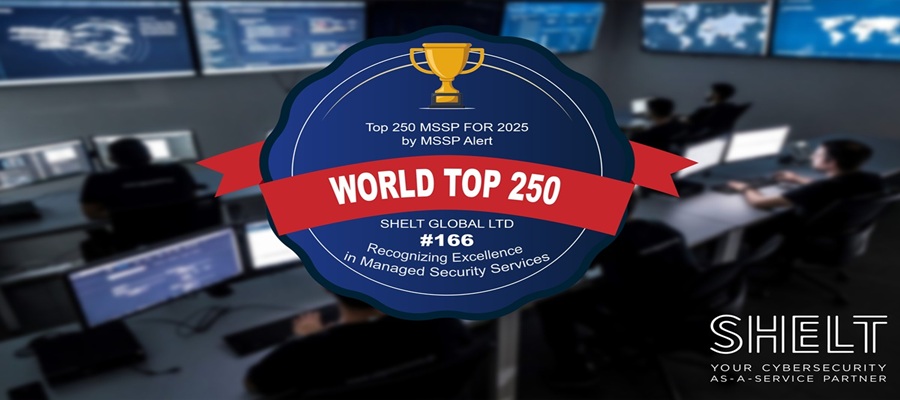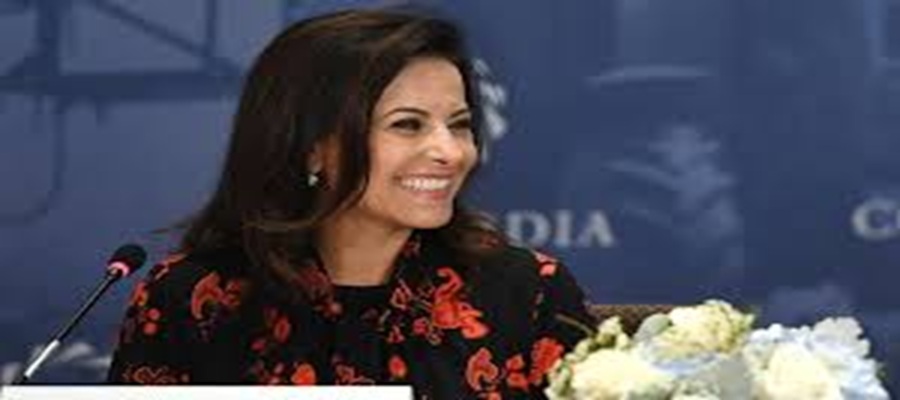Telecom
FG Commends Zinox Commitment to Local Content Adoption

Dr. Isa Ali Ibrahim Pantami, Director General of the Nigeria Information Technology Development Agency (NITDA), has hailed Zinox as an indigenous technology giant with the human capital potential and technological prowess to grow the adoption of local content in Nigeria.
Dr. Pantami, who paid a working visit to the headquarters of the company in Gbagada, Lagos on Friday November 16th 2018, expressed his delight with the massive infrastructure and technological facilities on display, noting that Zinox has the capacity to rival other global tech giants and extend its products and solutions beyond Nigeria to other markets.
Accompanying the DG was a technical entourage including Director e-Government Development and Regulatory, Dr. Vincent Olatunji; Director, IT Infrastructure Solutions, Dr. Usman GamboAbdulahi and National Coordinator – ONC, Barr. KasimShodangi.
Other members of the entourage include Mrs Chioma Oke-Agugo, Mr. Yusuf Yisa-Doko and two members of the media team.
Dr. Pantami said, “I am impressed with the huge capabilities, human and material resources and technological innovation available here in Zinox, which has remained an unassuming indigenous company that has recorded so many landmark strides in the Information and Communications Technology sector.”
“In addition to the excellent work done with INEC in improving the electoral process in Nigeria, we are also aware of the acceptance of Zinox products in other countries which they have been exported to and in major multinationals operating here such as Shell, Total, Chevron, among others.
“The Federal Government is eager to correct the imbalance in the consumption of local content by encouraging and supporting indigenous capacities in the IT sector.
“We are focused not only on increasing local content adoption but also ensuring that a major percentage of our indigenous technology software and products are exported to other African countries.
“Zinox possesses the resources, products, human capital and sheer equipment capacity to take the lead in this area.”
The NITDA DG who was led on a guided tour of the company by the Leo Stan Ekeh, Chairman, Zinox Group, witnessed first-hand the various infrastructure and facilities within the premises including the digital computer hardware manufacturing and assembly plant, telecoms e-Hub unit, Data Centre, bandwidth aggregation and digital security infrastructures, warehousing facilities as well as after-sales service and support centre, among others.
“From what I have seen today, I am confident that, given the right support from the government, Zinox can play a significant role in putting Nigeria on the global technology map.
“You can count on my support and that of the entire agency in this regard,” he enthused.
Also speaking, Ekeh who expressed appreciation to the NITDA helmsman for accommodating the visit within his busy schedule, disclosed that the Zinox Group remains the single largest 360 degrees ICT conglomerate in the sub-region with advanced competencies in the entire spectrum of the sector, ranging from hardware manufacturing, distribution, integrated ICT solutions, Telecoms, retail, world class support and much more with offices in many other countries and hubs in four continents.
He also reiterated the Group’s commitment to advancing local content adoption within Nigeria and beyond through the creative design and manufacture of digital products which anticipate the yearning and taste of the future consumer.
“We are an indigenous technology group that is absolutely committed to local content development and adoption.
“This has for several years informed our business practices as well as the design and manufacture of our products and solutions.
“While Zinox Technologies Ltd. as a company clocked 17 in October, the Group itself has been in the business of technology for over 32 years and not once have we embarked on retrenchments, even in the face of some of the difficult and challenging business cycles.
“Instead, we have taken the pains and even recently, increased staff salaries across board,” he disclosed.
The serial digital entrepreneur also seized the opportunity to plead for more institutional support and level playing ground for Nigerian tech companies.
“Government needs to come to the aid of tech companies in the country by giving them the wings to fly and achieve more through tax breaks or holidays and other incentives.
“The technology sector is one of the biggest employers of labour as entry requirements are not as stringent, when compared to other sectors.
“Presently, we face huge challenges in clearing our shipments and other technological components due to the heavy congestion at the ports.
“This has resulted in crippling demurrages and a tripling of transportation costs from the ports to our production plants and offices over the past few months, making it harder to compete and survive.
“The Government needs to find a solution to these issues.”
While presenting the Zinox Core i7 and GTX Legacy – two products from the Zinox Future Visions stable– to the DG, Ekeh restated his commitment and support for the government’s drive to create more employment opportunities for millions of Nigerians, while urging the media to partner with the agency in transforming the country’s communications narrative for the benefit of all.
With close to two decades of pioneering efforts and excellent service delivery, Zinox enjoys widespread acclaim as Nigeria’s foremost ICT Company.
In addition to its enviable status as pioneer manufacturers of Nigeria’s first internationally certified branded computers and mobile devices, the company has deployed some of the biggest projects in the continent, while institutionalizing high-end ICT solutions which have contributed in moving the sector and the Nigerian economy to the next level.
Telecom
SHELT Named in Prestigious 2025 MSSP 250 List for Cybersecurity Excellence

SHELT, a leading cybersecurity-as-a-service provider, has earned inclusion in the 2025 MSSP 250, the annual ranking of the world’s top 250 Managed Security Service Providers (MSSPs) by MSSP Alert, a CyberRisk Alliance publication.

SHELT
The list evaluates firms on business performance, service breadth, and industry impact, spotlighting those excelling in growth, operational excellence, and advanced managed security amid rising cyber threats. Selection criteria include annual recurring revenue, profitability, workforce expansion, business growth, and the depth of managed security offerings.
SHELT’s recognition underscores its investments in scalable security operations, threat intelligence, and tailored managed services across multiple regions, enabling clients to navigate complex risk landscapes effectively.
“Being recognised in the MSSP 250 is a meaningful milestone for our team,” stated Youssef Abillama, CEO of SHELT. “It validates our focus on building practical, resilient security services that help organisations manage risk and respond effectively to today’s evolving cyber threats.”
The company hailed the honour as testament to its teams’ dedication and expertise worldwide, reaffirming commitment to enhancing capabilities and delivering trusted cybersecurity solutions.
Telecom
Meta Names Ex-Trump Adviser Dina Powell McCormick as President

Meta Platforms, owner of Facebook, has appointed Dina Powell McCormick, a former adviser to President Donald Trump, as its new president and vice chairman, bolstering its leadership amid aggressive AI and infrastructure expansion.

Dina Powell McCormick
The announcement, made on Monday, positions Powell McCormick – who recently stepped down from Meta’s board after eight months – to guide overall strategy, including multi-billion-dollar investments in data centres and global partnerships.
A Goldman Sachs veteran with 16 years in senior roles and prior stints as deputy national security adviser under Trump and in the Bush administration, she brings deep finance and international ties to the role.
Meta CEO Mark Zuckerberg hailed her as “uniquely qualified” for the company’s next growth phase, while President Trump praised the move on Truth Social as a “fantastic choice”.
The hire signals Meta’s efforts to strengthen White House relations, following recent dinners with Trump and U.S. investment pledges worth hundreds of billions
Telecom
X Suspends Twitter Account for Rules Violation

X, the social media platform formerly known as Twitter, has suspended the @Twitter account, replacing its profile with a standard notice citing violation of platform rules.

Musk
The action, which occurred on Sunday, January 11, left users encountering the handle greeted by a bold “Account Suspended” message on a black screen, with no details provided on the specific rules broken or the duration of the suspension.
The development has sparked widespread confusion and nostalgia among users, given that Elon Musk rebranded Twitter to X in July 2023, approximately six months after acquiring the platform for $44 billion in late 2022.
The @Twitter handle had remained dormant since before Musk’s takeover, serving as a legacy remnant of the platform’s original branding, and its suspension appears to mark the final erasure of the Twitter name amid X’s ongoing efforts to combat spam, impersonation, and rule violations.
X’s official statement on the suspended page simply reads: “X suspends accounts that violate our rules,” without offering an appeal process or further explanation, unlike standard user suspensions.
Public reactions on social media ranged from humorous laments of “RIP Twitter” to speculation that the move resulted from automated moderation or a deliberate cleanup of legacy trademarks.
xAI’s Grok AI described it as a purposeful retirement of outdated elements rather than a genuine infraction, while neither Elon Musk nor X spokespeople issued any comment as of Monday morning.
This incident underscores the evolving identity of the platform under Musk’s ownership, which also saw a domain shift to x.com in 2024, further distancing it from its Twitter roots.
Industry observers note that while the suspension aligns with X’s stricter enforcement policies, the lack of transparency has fueled debates on consistency in applying rules to high-profile legacy accounts.

 News3 days ago
News3 days agoSERAP Sues INEC Over Alleged ₦55.9Bn Election Funds Diversion

 General News3 days ago
General News3 days agoMinistry of Finance Leads FG-Backed Deal to Deliver Quality Homes and Boost Agriculture in Niger State

 E-Financial3 days ago
E-Financial3 days agoNDIC Declares Second Liquidation Dividend for Heritage Bank Depositors

 Telecom3 days ago
Telecom3 days agoFG Plans to Invest $460m World Bank Loan in Fibre Infrastructure

 News3 days ago
News3 days agoAI Founders and Developers to Converge in Lagos for AI in Action 2026 conference

 News3 days ago
News3 days agoFG Inaugurates N40Bn CCTV Control Centre for Third Mainland Bridge

 E-Financial2 days ago
E-Financial2 days agoWema Bank Upgrades ALAT Banking App

 Telecom2 days ago
Telecom2 days agoX Suspends Twitter Account for Rules Violation

























